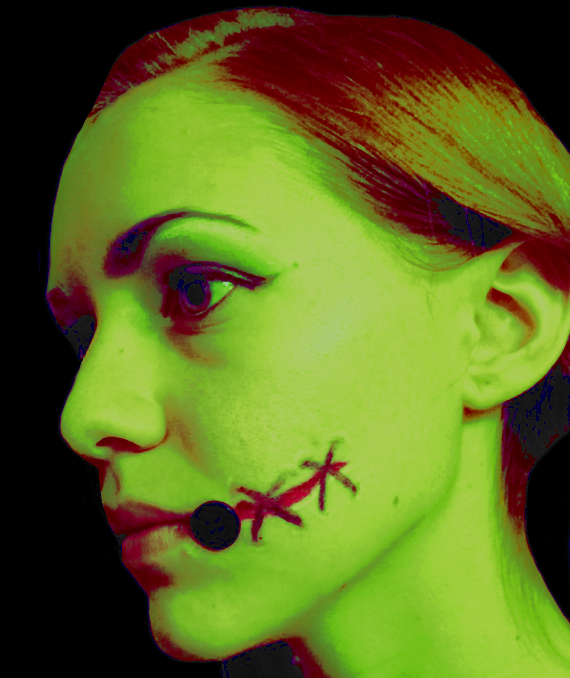I frequently wrestle with identity ambiguity. Daily, I find myself obsessing over that haunting question, “Who am I?” It’s already a hard enough dilemma as it is, without my mental illness complicating everything.
Ever since I found out I have pathological disturbances of mood, I frequently catch myself oscillating between two opposite modes of thought: one, that my disease is a totally separate entity that just happens to share my body with the “real” me; and two, that I am utterly and completely a product of that disease.
My struggle with identity reflects a spectrum of ways in which a person with mental illness might feel they have changed because of their diagnosis. At either end of this spectrum are under-identification with the disease, and over-identification with it.
When someone under-identifies with their diagnosis (in my case a mood- and personality-related disorder, though I expect these principles could apply to many mental illnesses), their feelings toward it may take the form of some degree of rejection, or even flat out denial of the disease’s existence. Thoughts like I can’t possibly be sick and I’m just normally an emotional person are common to find in this case. The reasons why a person might react in this way are far-ranging, understandable, and all totally normal, but for the most part they come down to fear: Maybe if I don’t think about how scary my illness is, it’ll go away.
Obviously, this type of thinking can cause problems when it’s time for that person to seek treatment. Denying the disease exists hinders any attempts to heal it, and what’s more, that kind of thinking will not make it go away. A person who is in denial is less likely to take advice from doctors or make efforts to live a healthier lifestyle.
Over-identification with a diagnosis, however, is also distressingly common, and can be just as damaging. Someone who aligns too much of their personality with their mood disorder may have beliefs such as everything I feel is just a symptom and my introverted/extroverted personality is just depression/mania. A person who gets stuck in this mental rut often observes symptoms where really there aren’t any, and mistakes themselves for their disorder. Because really, where do you draw the line between yourself and your disease? It’s an incredibly difficult if not impossible thing to do. Sometimes you end up walking around feeling like a mental illness with shoes on. Who could blame a sick person for accidentally believing they are nothing more than a broken brain?
I am a veteran of this type of over-identified thinking. For me, almost everything in my life comes down to the question of where my personality ends and where my symptoms begin. When am I just an excusably “down” person, and when are the electrochemical impulses in my brain diseased and out of whack? Will I ever be able to cease the motion of the ever-changing boundaries that separate my identity from my sickness? It’s one of the most challenging and frustrating philosophical debates I imagine a person can ever have with themselves, but to mankind’s collective dismay, the current state of neurological science leaves these questions infuriatingly unanswered.
Ultimately, whether you under- or over-identify with a mental illness, there’s a good chance you’ll find a way to adapt your beliefs into your lifestyle, and make them work for you. Scouting out the middle ground between the two ends of the identity spectrum is a terribly difficult thing to do and takes a lot of practice and near-constant introspection to achieve, and even then, that identity sweet spot may fall out of view sometimes. And if you find that either of these issues affects you too deeply – you reject your disease and therefore its treatment, or you believe you’re nothing more than your disorder – it may be time to seek help and make a change.


Very well written!
LikeLike
Thank you!
LikeLike
Thank you so much for this blog post, Zoe. I came across it thanks to your dad’s tweet with the link to it. I have been suffering from mental health issues for years and these last few weeks have been very difficult to the point where I cannot identify with myself, I just see my mental illness. Thankfully, I have already reached out for some help because I believe that I have bipolar disorder and I am seeking help from some professionals in regards to the symptoms I am experiencing. It’s taken a very long time to get them to listen to me and to understand that there is something other than just severe depression and anxiety going on. One thing I know for sure is that something is very wrong and I need help. Your post has made me feel as though I am not alone with my struggle of identity and I wanted to thank you and let you know that your post has really helped.
LikeLike
I’m really honored that I was able to help you by posting about an issue you can relate to. Please know that you’re not alone, that there are many many people out there who understand your suffering and are able to help you with it, and it’s just a matter of finding them. Getting a proper diagnosis can be very difficult, as I’m sure you’ve experienced, but it all pays off when your doctor is able to use it to treat you with the correct meds and therapy. Please keep trying. There’s a lot of room for progress.
LikeLike